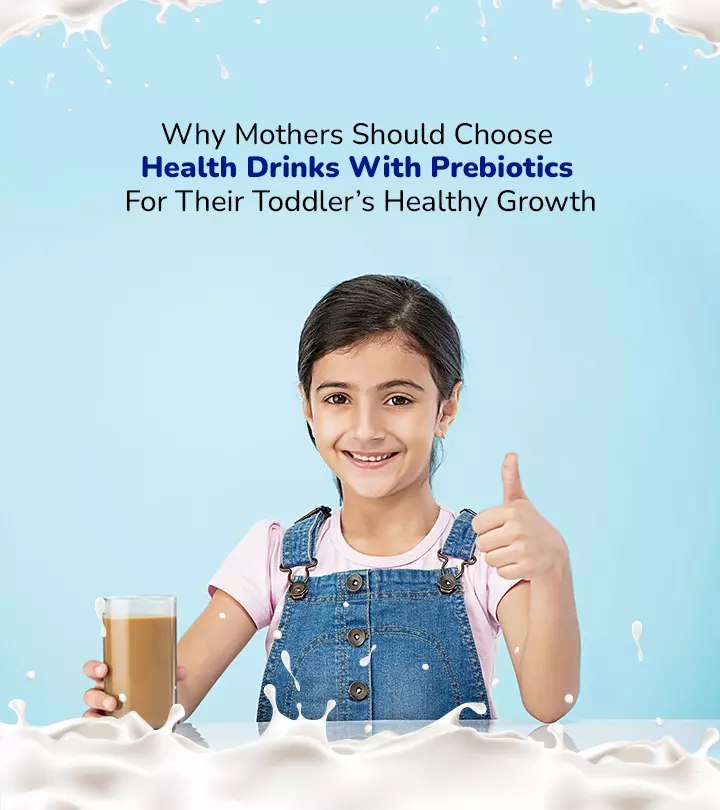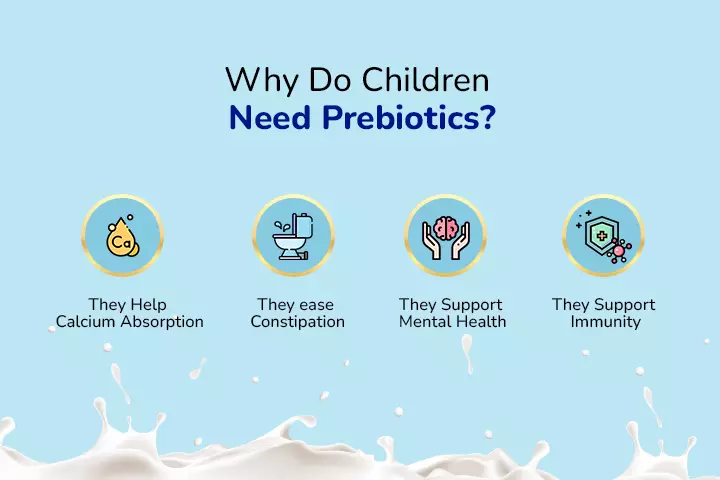

There is no dearth of health drinks for children in the market, but how do you differentiate those that help meet the nutritional needs of toddlers from the ones that make claims they cannot fulfill? The primary ingredients of most health drinks—proteins, minerals, calcium—may be similar, but what sets apart an effective nutrition drink is the nutrient quotient of the other components. For instance, health drinks with prebiotics have the upper hand when compared to those without them. Why?
Prebiotics help digestion by improving gut health, and adding them to your child’s health is beneficial. Before diving into details, it is essential to understand the difference between probiotics and prebiotics.
What Are Probiotics?
Probiotics are live cultures that populate the gut with good, healthy bacteria and combat gastrointestinal symptoms. Usually, most bacteria dwelling in the gut aid digestion and other bodily functions. However, there are harmful types, too, which may take over the lower digestive tract and cause gas, bloating, diarrhea, and stomach infections. While science supports most benefits of probiotics, pediatricians attest that children do not need to take probiotics on a regular basis.
What Are Prebiotics?
The difference between probiotics and prebiotics goes deeper than changing an ‘o’ to an ‘e’.
Prebiotics are non-digestible carbohydrates, primarily fiber. They are not destroyed by digestive enzymes or stomach acids and move through the intestinal tract to settle in the lower digestive system. They help feed the good bacteria–probiotics–in the gut, which in turn, aids digestion.
We can look at prebiotics as fertilizers that promote the growth of probiotics. Without prebiotics, good bacteria may not be able to thrive. You may include an array of probiotic-rich foods in your child’s diet, but if these probiotics do not have prebiotics to feed on, it’s all in vain.
Prebiotics and probiotics take different paths to achieve the same goal–a healthy gut and a functioning digestive system. While probiotics add good microorganisms to the system, prebiotics promote the growth of existing ones.
Why Do Children Need Prebiotics?
Prebiotics enhance the effectiveness of probiotics, and they work in tandem to ensure good gut health. They help restore the balance of the gut microbiota so that the good bacteria are always in control of the immune system.
Besides improving gut health, prebiotics are beneficial for kids in the following ways:
- They Help Calcium Absorption
Several studies show that prebiotics help a child’s body absorb calcium, which is vital for bone health and growth (1).
- They ease Constipation
Prebiotics can help relieve constipation by improving stool consistency, the number of bowel movements, and bloating (2).
- They Support Mental Health
A significant amount of research links prebiotics to brain health and suggests that both probiotics and prebiotics support psychological functions via several mechanisms (3). Many functions related to brain development have a connection to the gut.
- They Support Immunity
Prebiotic fermentation produces Short chain fatty acids, which help the immune system fight and defeat pathogens. Prebiotics stimulate the immune system directly or by increasing the population of probiotics in the gut (4).
Sources Of Prebiotics
Prebiotics can be found naturally in a wide range of foods, including bananas, apples, berries, wheat, oats, and cherry tomatoes. You may also find them in garlic, onions, and soybeans. However, despite prebiotics being readily available, the average toddler does not consume enough of them.
Moreover, toddlers can be fussy eaters, and if they do not like particular foods, getting prebiotics into their system may be a struggle. To make things easier, food companies are adding prebiotic fibers to nutrition bars, pasta, cereals, and other packaged products. However, most of them are loaded with sugar and may cause more harm than good.
The best alternative to natural prebiotics would be an effective health drink like Aptagrow. This nutritious milk drink for growing kids has a unique blend of prebiotics. Its Nutri-absorb formula supports better absorption of nutrients for overall growth. Besides, it has 37 essential nutrients to support height gain, immunity, and brain development.
While shopping for prebiotic supplements for kids, parents are suggested to read labels carefully. Most over-the-counter products are not regulated and do not need FDA approval to be sold. Besides, there’s always the risk of falling for false claims. It’s always best to consult a pediatrician and choose reliable, established brands like Aptagrow.
As children grow, parents must pay attention to their nutritional requirements and ensure they follow a balanced diet. Along with essential nutrients, a healthy diet must contain prebiotics to help improve your toddler’s gut health. Every toddler may consume a prebiotic-rich health drink, regardless of digestive problems. It must be kept in mind that a child’s digestive health may be affected by several factors, including stress levels, diet, and surroundings. Always consult your healthcare provider to ensure your child’s condition is correctly diagnosed before treatment.
References
- Prebiotics
Bone and Mineral Metabolism - Therapeutic Effects of Prebiotics on Constipation: A Schematic Review
https://pubmed.ncbi.nlm.nih.gov/32048977/ - The Effects of Probiotics and Prebiotics on Mental Disorders: A Review on Depression Anxiety Alzheimer and Autism Spectrum Disorders
https://pubmed.ncbi.nlm.nih.gov/31914909/ - Effects of prebiotics on immune system and cytokine expression
https://pubmed.ncbi.nlm.nih.gov/27704207/
Community Experiences
Join the conversation and become a part of our nurturing community! Share your stories, experiences, and insights to connect with fellow parents.














